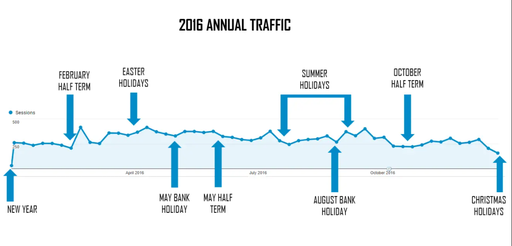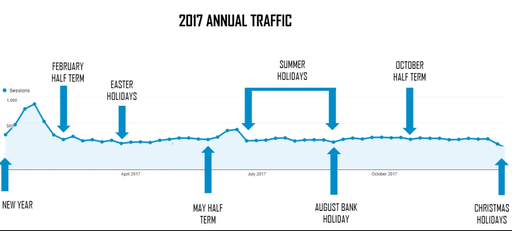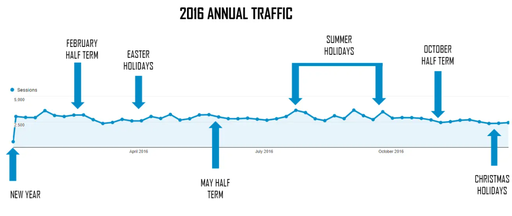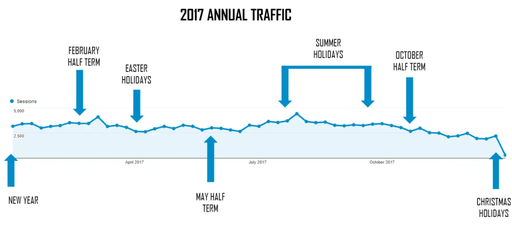Do the school holidays affect your B2B website traffic?
We kind of love the school holidays. Quieter roads on the commute to work mean an extra ten minutes or so in bed. But the quietness of the roads, got us thinking about website traffic and what the school holidays mean for B2B businesses like ours (and yours).
We had a meeting and looking at our traffic at the end of March, we thought we’d create a case study, because there’s nothing more we love doing than deep website traffic analysis and discovering new marketing trends.
We looked at the website traffic data on Google Analytics ourselves raw data ourselves. The only way we can spot how the school holidays affects our traffic is by dissecting it. We took our traffic over the course of two years, 2016 & 2017, and annotated the different school holidays on the charts.
Data Set 1 [BarkWeb]


We investigated the data of a business that serves both B2B and B2C customers, to see the affects that school holidays had on their website traffic
Data Set 2


No matter how big or how small, it is evident that there are drops in traffic around the school holidays. The most drastic drops being the Christmas holidays and February Half Term.
There could be several reasons behind why traffic is dropping around these times, such as:
- Parents taking the time off to look after their children
- Professionals taking time off around bank holidays
- The holiday season, more people are going away
Of course, there are days when the clear majority are not at work. Looking at our session data from 2016 and 2017, there’s always a dip in traffic at weekends and Bank Holidays. This is completely expected. The most interesting thing is the smaller dips in traffic occurring based on school terms and seasonal holidays.
Our data shows that school holidays do affect website traffic. Some businesses may be hit harder than others based on whether they are B2B or B2C. Clearly, the holidays have influenced our traffic at BarkWeb and the best thing we can do is react positively to this and most importantly, learn from the data we are seeing.
The findings from Data set 2 are slightly different. Although some of the holidays have a minor affect on traffic, it does take the hit as hard. It can be noted that Christmas in 2016 didn’t much of a traffic loss, compared to Data set 1 where there was a noticeable fall in traffic. During the 2017 summer holidays, there was a peak in traffic. When looking at this data, you need to consider any marketing campaigns you may have been running that the time which could have resulted in more traffic to your website.
To really understand your own audience and website trends, it is important to dive into this data and see for yourself. This way you can determine your online strategy to be in line with your traffic trend.
How should you react to lower traffic during holiday seasons?
Some seasonal trends are common. For example, if you’re an ecommerce website, you’re likely to see a spike in sales in the lead up to Christmas. The important thing is to react to these seasonal trends, not just let them pass by. Use each one as an opportunity to explore different content avenues and keep your website relevant.
We are not all on holiday (although, with the recent English weather we wish we were)
Not all your target market is on holiday, so your marketing shouldn’t die down. It’s business as usual, so continue blogging, posting on social and running your paid search campaigns. There is still an audience who are sitting at their desks, looking for a site just like yours.
Utilise the quiet times
Having a period where you’re getting less enquiries or sales is extremely frustrating. However, this is the perfect opportunity to spend time brushing up on your marketing campaigns or creating future strategies for your product or service. Do this whilst it’s quiet and you’ll be prepared for the busy bursts.
Know your holidays
The thing about holidays is… they happen every year! If you don’t know what they are and when they are yet, you really should brush up on this. Knowing your holidays is the perfect opportunity to create content and experiment a bit based on seasonal trends. Christmas & New Year? Run a yearly round up blog post and/or a new year’s resolution one to stay on topic. Easter? Talk about spring, the new financial year. These trends allow you to jump on a train you wouldn’t usually and do something topical to what’s going on. This can also make your product or service 100 times more relatable.
In conclusion
The only way to determine whether your website traffic is affected by school holidays is to investigate your own website data and analyse this yourself. From our discovery, it does have an effect, and public holidays take the hit a lot harder than school holidays.
Although a drop-in traffic may be disheartening, you can use this information and data to your advantage by devising a strategy in-line with your own traffic trend. Using holidays as marketing material is also a great shout to keep your business or brand on topic and relevant.

